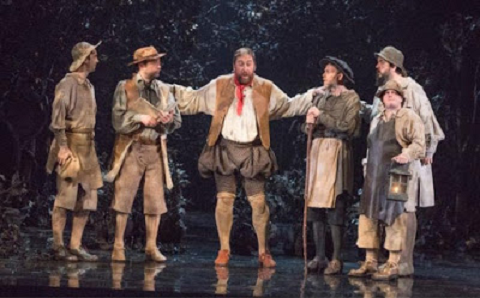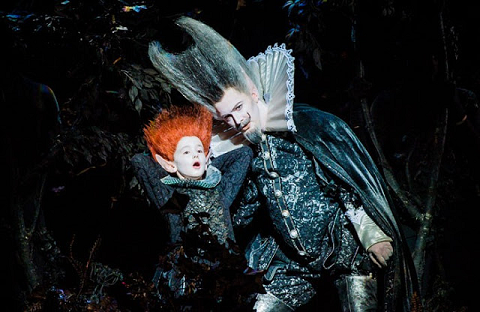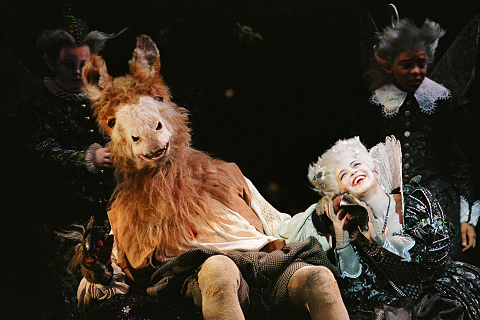The First Act takes place in dense forest, at night, when nothing is as it might seem. Do we see trees or projections thereof, or both? What do the shadows
conceal, even when the moon slips fleetingly through clouds? John Bury's designs are immortal because they are so abstract, and surprisingly ‘modern’,
though they ostensibly resemble the well-known Victorian painting by John Noel Paton - another reversal of visual imagery. Since Shakespeare's A Midsummer Night's Dream operates on so many simultaneous levels, the one thing to be wary of is literal realism.
How Britten must have relished the opportunities to express in music what could not be said in words. Like Shakespeare, Britten was poking fun at a world
that mistakes power for virtue and convention for truth. Theseus and Hippolyta - ancient Greeks in Elizabethan costume - sneer at the Mechanical's play.
But perhaps the joke is on them. A Bergomask before bedtime might just have unforeseen consequences. Britten's Gloriana was long misunderstood by
audiences who took it at face value. A Midsummer Night’s Dream, written barely seven years later, has an infinitely superior plot and the music is
much more sophisticated, but there are parallels. And in A Midsummer Night's Dream there are levels which would have had personal resonance for
the composer.
Jakub Hrůša's conducting is so idiomatic that we can almost feel the caustic bite of Britten's humour, while also feeling the pain that lies beneath the
surface. Britten's score sparkles with variety. Figures shape shift as swiftly as they are delineated, Elizabethan forms pop up from the endlessly elusive
and very contemporary stream of consciousness. Hrůša doesn't smooth over the spikiness, but keeps the pace animated, so the orchestral playing seems to fly
free, like the Fairies - the Elementals to the earthbound Mechanicals. The moments of reverie glowed, the lower woodwinds and brass breathing ominous
mystery. The London Philharmonic Orchestra seemed to shine for Hrůša, even more than they usually do. Perhaps Hrůša brought insight from having conductedRusalka and The Cunning Little Vixen at Glyndebourne in the past, two operas which also have close affinity with A Midsummer Night's Dream. Hrůša seems to intuit how pertinent the variety in the score is to the meaning of the opera. Everything changes at the
turn of a point, themes transform, like magic, nothing can be taken for granted. Because Hrůša got such alert, taut playing from the orchestra, he could
bring out the innate anarchy beneath Britten's elegantly defined orchestration. Orchestrally, this was an exceptionally vivid performance, so strong that
it will live in the memory.
 Matthew Rose (centre) as Bottom, with the Mechanicals. Photo credit: Robert Workman.
Matthew Rose (centre) as Bottom, with the Mechanicals. Photo credit: Robert Workman.
The cast, acting as well as singing, were of an equally high order. Matthew Rose first sang Bottom ten years ago. Now, he's matured and so has his
characterization of the part, which will probably now be hard for anyone else to improve upon. Bottom is Everyman but no fool. Rose's voice carries
authority, which is why his friends turn to him as leader. Even with the head of an ass, and his bottom in the air, Rose makes the part dignified and
sympathetic. Rose makes the ‘donkey’ wheeze in Bottom's lines sound so natural that, even in the palace in the final Act, a bit of donkey-ese breaks
through irreverently. Even his body movements worked in synch. Equally strongly cast were the
Mechanicals - David Soar (Quince), Sion Goronwy (Snug), William Dazeley (Starveling), Anthony Gregory (Flute) and Colin Judson (Snout). In ensemble, they
were superb, singing and speaking as if to the manner born. In the play, and in the opera they are much more significant than Theseus (Michael Sumuel) and
Hippolyta (Claudia Huckle).
As Oberon, Tim Mead's high, sharp timbre dripping malevolence, reversing the more usual baroque stereotype of counter tenor as hero. He towered over
Kathleen Kim, as Tytania. Good visual casting, reflecting the power play between them. Kim, though, was no submissive. She sang forcefully and with élan -
no surprise that she's a Glyndebourne favourite. Oberon's hair was styled in two peaks, resembling the ears of an ass. Wonderfully subtle touch. The
lovers, Lysander (Benjamin Hulett), Hermia (Elisabeth DeShong), Helena (Kate Royal) and Demetrius (Duncan Rock) were also well cast, DeShong creating
Hermia's feisty, strong-willed personality with particular definition.
 David Evans (Puck) and Tim Mead (Oberon). Photo credit: Robert Workman.
David Evans (Puck) and Tim Mead (Oberon). Photo credit: Robert Workman.
But Puck is the agent of insurrection, upon which the plot turns, and particularly symbolic for Britten himself. Puck is not a singing part, but David
Evans stole the show, quite an achievement for an actor stepping in at short notice, into a part that's so demanding that it's notoriously difficult to
cast. Britten dreamed that it could be played by a young athlete whose voice was beginning to break: a changeling between two worlds, a Britten innocent on
the cusp of corruption. Tadzio, with a voice. And what a voice! Evans is cheeky and shrill like a boy, yet also rebellious and assertive like someone
passing into his teens, though he looks younger. He also projects with great force, while respecting the curious rhythm in the text. Evans runs up and down
stage, sailing into space on a guy rope, popping in and out of the scenery, without missing a note. Did Britten identify with Puck, who could get away with
things a nice, obedient boy like Young Ben could not? And yet Puck is a tragic figure, not so much because he doesn't belong but because his freedom cannot
last. Will he be sucked into Oberon's sick games? Evans will grow up, but this moment of glory will live with him for the rest of his life.
Catch this Glyndebourne A Midsummer Night's Dream.
Anne Ozorio
Britten: A Midsummer Night’s Dream
Theseus (Michael Sumuel), Hippolyta (Claudia Huckle), Tim Mead (Oberon), Kathleen Kim (Tytania), David Evans (Puck), Benjamin Hulett (Lysander), Elisabeth
DeShong (Hermia), Kate Royal (Helena) and Duncan Rock (Demetrius), Matthew Rose (Bottom), David Soar (Quince), Sion Goronwy (Snug), William Dazeley
(Starveling), Anthony Gregory (Flute) and Colin Judson (Snout); Director, Peter Hall; Conductor, Jakub Hrůša, Designer, John Bury; London Philharmonic
Orchestra.
Glyndebourne Festival Opera; August 16, 2016


